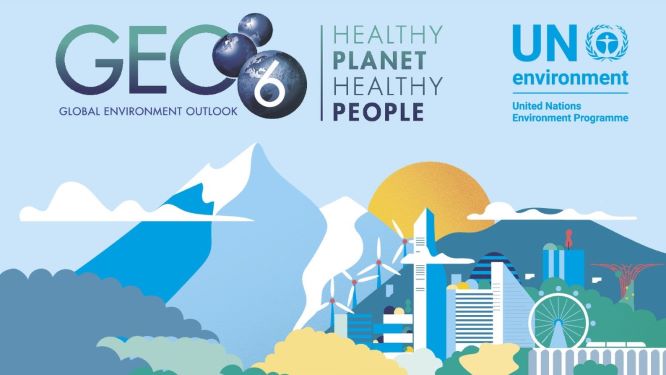

A quarter of all premature deaths and diseases worldwide are due to manmade pollution and environmental damage, the United Nations said in a landmark report on the planet’s perilous state.
The sixth Global Environment Outlook (GEO-6), under the theme “Healthy Planet, Healthy People”, aims to provide a sound, evidence-based source of environmental information to all. GEO-6 makes many arguments with substantial evidence about the Human impact on environmental change.
The report warns that deadly smog-inducing emissions, chemicals polluting drinking water, and the accelerating destruction of ecosystems crucial to the livelihoods of billions of people are driving a worldwide epidemic that hampers the global economy.
The Global Environment Outlook (GEO) – a report six years in the making compiled by 250 scientists from 70 nations – depicts a growing chasm between rich and poor countries as rampant over-consumption, pollution and food waste in the developed world leads to hunger, poverty, and disease elsewhere.


As greenhouse gas emissions continue to rise, regular droughts, floods and superstorms have made it worse combined with climbing sea levels, there is a growing political consensus that climate change poses a future risk to billions.
But the health impacts of pollution, deforestation and the mechanized food-chain are less well understood. Nor is there any international agreement for the environment close to covering what the Paris accord does for the climate. The GEO compiles a litany of pollution-related health emergencies. It said that poor environmental conditions “cause approximately 25 per cent of global disease and mortality” — around 9 million deaths in 2015 alone.
Lacking access to clean drinking supplies, 1.4 million people die each year from preventable diseases such as diarrhoea and parasites linked to pathogen-riddled water and poor sanitation. Chemicals pumped into the seas cause “potentially multi-generational” adverse health effects, and land degradation through mega-farming and deforestation occurs in areas of Earth home to 3.2 billion people.
The report says air pollution causes 6-7 million early deaths annually. And the way Earth is set, unchecked use of antibiotics in food production will see drug-resistant superbugs become one of the largest causes of premature death by mid-century. “Urgent action at an unprecedented scale is necessary to arrest and reverse this situation,” said a note to policymakers accompanying the report.
The report called for a root-and-branch detoxifying of human behaviour while insisting that the situation is not unassailable. Food waste for instance, which accounts for 9 per cent of global greenhouse gas emissions, could be slashed. The world currently throws away a third of all food produced. That figure is fuelled by 56 percent in richer nations going to waste. Ms. Gupta GEO co-chair,”Everyone is saying that by 2050 we have to feed 10 billion people, but that doesn’t mean we have to double production. If we reduce our waste and perhaps have less meat you could immediately reduce that problem.
At the same time, she acknowledged, “that would require changes in the way we live.” The report also called for a rapid drawdown in greenhouse gas emissions and pesticide use to improve air and water quality. GEO co-chair Paul Ekins said, “Human behaviour is due to environment. It’s the way we eat. It’s the way we get around, it’s the energy we use and it’s how we build our homes.”
The report estimates that global infrastructure will increase by two thirds by 2050. “The way it is built will determine what kind of world we have,” Mr. Ekins said. The GEO draws on hundreds of data sources to calculate the environmental impact on over 100 diseases. Sources close to the negotiations told media agencies that some developed nations, led by the United States, had threatened not to “welcome” the GEO report — a procedural but nonetheless significant hurdle if nations are to agree on the necessary cuts in waste, overconsumption, and pollution.
Ms. Gupta said that nations, however big or small, would all have to adapt to the environmental reality facing every human on the planet.
With inputs from Agencies
India’s ethanol initiative has helped India save Rs. 1,26,210 crore in foreign exchange by reducing…
Noida-based green energy leader NexGen Energia Ltd has secured a $1 billion equity investment commitment…
As Odisha takes firm steps toward a just transition from fossil fuels to renewable energy,…
Bio-Integrated cladding for greener cities, an innovative solution by a 29-year-old Indian architect, has won…
In a novel move, Farmwatt Innovation has launched a long-term training and capacity-building initiative focused…
State owned Bharat Petroleum Corporation Ltd (BPCL) has joined hands with GPS Renewables Pvt Ltd…